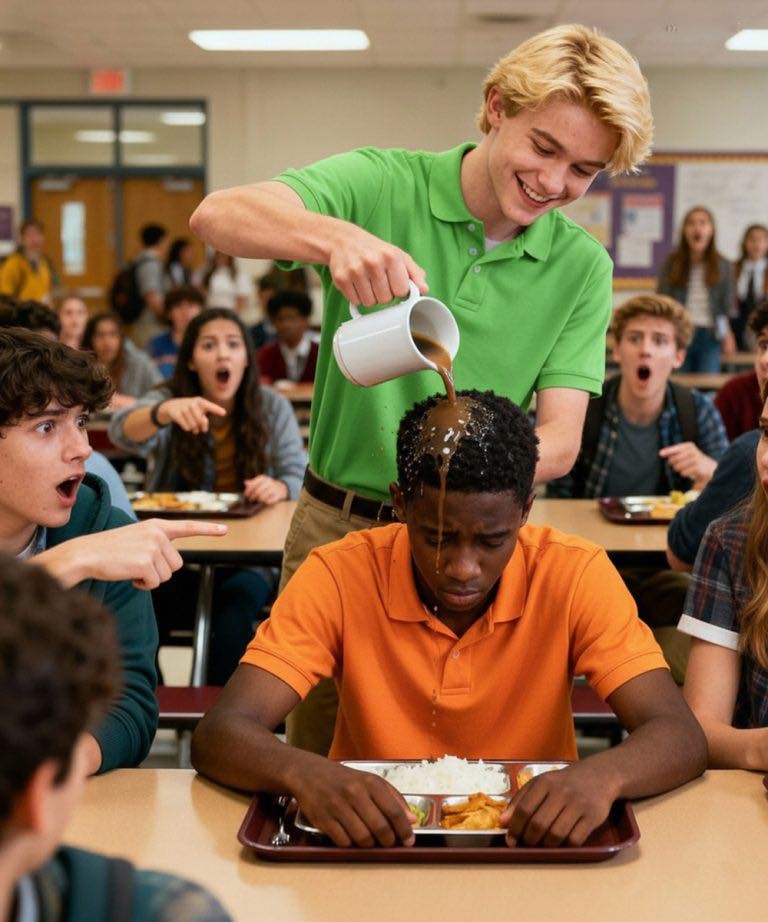The cafeteria at Lincoln High School in Chicago buzzed with its usual mid-morning rhythm — laughter, clinking trays, gossip echoing off tiled walls. To most students, it was just another day. But for sixteen-year-old Marcus Johnson, it was a new beginning.
Fresh from Atlanta, Marcus carried his lunch tray carefully through the crowd, moving with the quiet confidence of someone who had learned long ago how to survive being “the new kid.”
He was tall, lean, and calm — the kind of calm that came from discipline, not shyness. After his mother took a new nursing job that kept her traveling, Marcus had moved in with his aunt on Chicago’s South Side. He missed home, but he understood change. What he didn’t expect was how fast the welcome could sour.
As he scanned the cafeteria for an open seat, a voice sliced through the noise.
“Well, well — look who’s here. The new guy.”
The words came from Tyler Brooks, a junior with a reputation for trouble and an audience always eager to watch him perform. He walked toward Marcus, coffee cup in hand, grinning like a predator testing its prey. Two of his friends followed close behind, hungry for entertainment.
Marcus kept walking. He’d seen this type before — loud kids who needed attention more than air. But ignoring Tyler only fed the fire.
“You think you can just walk in here like you run the place?” Tyler sneered, stepping in front of him. “We run things here.”
Marcus met his eyes — not with fear, but with silence. And that silence infuriated Tyler.
Without warning, Tyler tipped his coffee cup forward. The brown liquid splashed across Marcus’s shirt, hot and sudden. The cafeteria went dead silent.
“Welcome to Lincoln High, rookie,” Tyler said with a smirk, tossing the empty cup into the trash.
The smell of burnt coffee filled the air. Marcus’s fists clenched. The sting of humiliation spread faster than the heat of the drink. Every instinct screamed for him to fight back. But eight years of Taekwondo training had drilled something deeper into him: real strength isn’t what you show when you strike — it’s what you hold when you don’t.
He took a long breath, set down his tray, and calmly walked away. The crowd parted, whispering, laughing, staring.
That night, Marcus replayed the moment in his head. The laughter. The burn. The silence. He could have taken Tyler down in seconds — one kick, maybe two. But he hadn’t. And though his pride ached, somewhere beneath it, a quiet satisfaction grew. He had stayed in control.
By the next morning, everyone had heard about “the coffee incident.” Some called Marcus weak. Others said he had guts for not reacting. But to most, he was just the kid who got humiliated and didn’t fight back.
That reputation didn’t last long.
In gym class later that week, Coach Reynolds announced they’d be starting a self-defense unit. Fate — or karma — had a sense of humor. Marcus was paired with Tyler.
Tyler grinned as they faced each other. “Looks like you’ll finally get your shot, new guy.”
Marcus just nodded, rolling his shoulders loose. He wasn’t there to prove anything.
“Remember,” Coach said, watching the pairs line up, “this isn’t about aggression. It’s about control. Technique, not ego.”
The whistle blew. Tyler lunged first — wild, fast, uncoordinated. Marcus pivoted, deflecting the blows easily. Another lunge, another block. Then, in one fluid motion, Marcus stepped to the side and landed a controlled kick squarely against Tyler’s ribs.
The sound cracked through the gym.
Gasps. Silence. Then whispers.
Tyler staggered backward, eyes wide, clutching his side. Marcus stood motionless, steady, breathing evenly. He hadn’t attacked — he had defended, with precision and restraint.
Coach blew the whistle again, face unreadable. Then he nodded. “That,” he said, loud enough for everyone to hear, “is control. That’s strength.”
Tyler said nothing. The rest of the class watched Marcus with a new kind of respect — quiet, uncertain, but real.
By the next day, the whispers had changed.
“Did you see that kick?”
“Dude didn’t even look mad.”
“He’s legit, man. Taekwondo champion or something.”
For the first time since moving to Chicago, Marcus felt the weight on his shoulders lift.
A week later, after class, Tyler approached him alone. No smirk, no entourage. Just an awkward shuffle and a mumbled, “Hey.”
Marcus turned, waiting.
“About the coffee thing,” Tyler said, eyes on the floor. “That was messed up. I was just being stupid.”
Marcus studied him — saw the embarrassment, the regret. “You don’t have to like me,” he said quietly. “But you’re not gonna disrespect me again.”
Tyler nodded once. “Yeah. Fair enough.”
It wasn’t friendship. But it was understanding — the kind that doesn’t need words.
Over the next few weeks, things changed. Marcus joined the school’s martial arts club, and soon, other students followed. He didn’t brag or show off; he just practiced — disciplined, focused, steady. People noticed. Even teachers did.
At home, his aunt would ask, “You making friends, baby?”
Marcus smiled. “Something like that.”
By winter, Marcus’s quiet confidence had become something people admired instead of mocked. Tyler eventually joined the martial arts club too — maybe curiosity, maybe guilt. But when he did, Marcus welcomed him like anyone else.
When the regional Taekwondo championship came around, Marcus represented Lincoln High. The gym was packed. Students waved signs and chanted his name. In the crowd, Tyler stood near the back, clapping with the rest.
Marcus fought with precision, calm, and grace. When the referee raised his arm in victory, the crowd erupted. He smiled — not because of the medal around his neck, but because of what it meant. He hadn’t won through revenge. He had won through control.
After the match, as he walked off the mat, Coach Reynolds clapped him on the shoulder. “Proud of you, son,” he said. “Most kids would’ve swung back in that cafeteria. You chose discipline. That’s rare.”
Marcus nodded. “You taught us to control chaos, not add to it.”
The coach smiled. “Guess you learned the lesson better than most.”
That Monday at school, things were different. The same hallways that once felt like a battlefield now felt like home. Marcus had earned something far stronger than popularity — respect.
Even Tyler stopped him in the hall, holding out a fist. “Hey, man. Congrats on the win.”
Marcus bumped it lightly. “Thanks.”
“Guess I picked the wrong guy to mess with, huh?” Tyler said with a sheepish grin.
Marcus laughed. “Nah. You just picked the wrong reason.”
From then on, there were no more coffee cups, no more taunts. Just mutual acknowledgment — the kind that comes only after someone earns it.
Months later, Marcus gave a short talk at a school assembly about discipline and respect. Standing in front of hundreds of students, he didn’t talk about revenge or fighting back. He talked about choice.
“Strength,” he told them, “isn’t about how hard you can hit. It’s about how hard you can hold your temper when it matters most. Anyone can react — but it takes real power to stay in control.”
The auditorium was quiet when he finished. Then came the applause — slow, steady, genuine.
Marcus smiled. Somewhere in the crowd, he caught Tyler’s eye. The kid who once tried to humiliate him now clapped the loudest.
Marcus didn’t need to say anything. The lesson had already been learned — by both of them.
Because true strength isn’t shown in victory. It’s shown in restraint.


